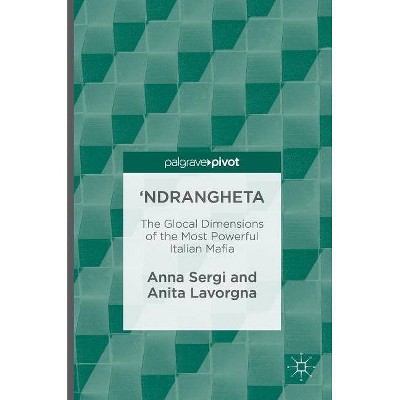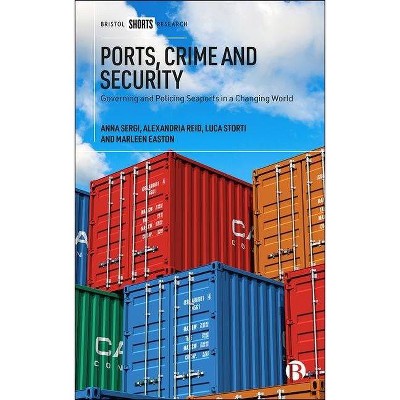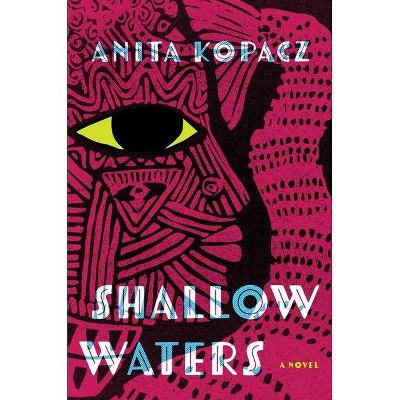'Ndrangheta - by Anna Sergi & Anita Lavorgna (Hardcover)

Similar Products
Products of same category from the store
AllProduct info
<p/><br></br><p><b> Book Synopsis </b></p></br></br>This book presents an historical and sociological account of the Italian mafia-type organisation known as the 'ndrangheta. It draws together diverse perspectives on the various 'ndrangheta clans and their behavioural models, focusing specifically on their organisational skills, their bonds with Calabrian society and Calabrian communities around the world, their mobility, and their characterisation as poly-crime organisations. <br/>The authors demonstrate that 'ndrangheta clans have an innovative way of being and doing mafia work through a dense network of relationships both in the 'upperworld' and in the 'underworld', a particularly acute sense of business, a reputation built on the protection of blood and family ties, and, last but not least, a symbiotic relationship and camouflage within Calabrian society. By focusing on both the structures and the activities of the clans and with findings based on judicial documents, this book explores why the 'ndrangheta is today labeled as "the most powerful Italian mafia". It will be of great interest to upper-level students and scholars of organised crime and sociology.<br/><p/><br></br><p><b> From the Back Cover </b></p></br></br>This book presents an historical and sociological account of the Italian mafia-type organisation known as the 'ndrangheta. It draws together diverse perspectives on the various 'ndrangheta clans and their behavioural models, focusing specifically on their organisational skills, their bonds with Calabrian society and Calabrian communities around the world, their mobility, and their characterisation as poly-crime organisations. <br/>The authors demonstrate that 'ndrangheta clans have an innovative way of being and doing mafia work through a dense network of relationships both in the 'upperworld' and in the 'underworld', a particularly acute sense of business, a reputation built on the protection of blood and family ties, and, last but not least, a symbiotic relationship and camouflage within Calabrian society. By focusing on both the structures and the activities of the clans and with findings based on judicial documents, this book explores why the 'ndrangheta is today labeled as "the most powerful Italian mafia". It will be of great interest to upper-level students and scholars of organised crime and sociology.<br/>Anna Sergi is Lecturer in Criminology at the University of Essex, UK. Her research interests and publications include mafia, organised crime, comparative policing, criminal law and criminal justice systems. She is also the Chair of the British Society of Criminology Early Career Researchers Networks. <br/>Anita Lavorgna is Lecturer in Criminology at the University of Southampton, UK. Her research interests and publications include organised crime, cybercrime, and crime prevention.<p/><br></br><p><b> Review Quotes </b></p></br></br><br>"The publication itself 'Ndrangheta: The Glocal Dimensions of the Most Powerful Italian Mafia is an instance of the emerging trend towards shorter, sharply focused monographs. One must not be deceived, however, by the short length of the book: it is by no means a light read. ... The work is - in its simplicity - intelligently written. ... we unreservedly recommend it to both expert and lay readers ... ." (Georgios Papanicolaou and Georgios A. Antonopoulos, The Canadian Criminal Justice Association, ccja-acjp.ca, January, 2017)<p></p><p>"Refreshingly well written and insightful in their approach, both as revealing histories and as analyses of how and why Italian organized crime has developed and changed over time and across locations. ... 'Ndrangheta, by developing new evidence and fresh arguments, are effective guides for taking another look at a distinctive chapter of Italian and Italian American history and for understanding the persistence of organized criminal networks around the world." (Jay S. Albanese, Italian American Review, Vol. 7 (2), 2017)</p><br><p/><br></br><p><b> About the Author </b></p></br></br>Anna Sergi is Lecturer in Criminology at the University of Essex, UK. Her research interests and publications include mafia, organised crime, comparative policing, criminal law and criminal justice systems. She is also the Chair of the British Society of Criminology Early Career Researchers Networks. <br/>Anita Lavorgna is Lecturer in Criminology at the University of Southampton, UK. Her research interests and publications include organised crime, cybercrime, and crime prevention.<br/>
Price History
Price Archive shows prices from various stores, lets you see history and find the cheapest. There is no actual sale on the website. For all support, inquiry and suggestion messagescommunication@pricearchive.us




















